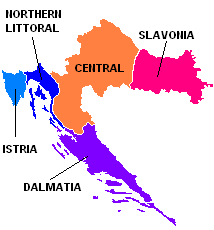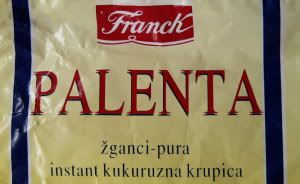• • • Easy Croatian: 58 Colloquial and Formal
Introducing Colloquial Words
In most languages, there are difference between "street" language, and "official" language. Some words are never heard in Parliaments or TV news, for instance, English "ain't" and "wanna" are often used, but not in "serious" occasions. Such words are called colloquial. Some of them are:
meaning Standard colloquial "boy", "boyfriend" mlàdī̱ć dečko "girl", "girl" djèvōjka cura "small girl" djevò̱jčica curica "lack", "miss" (verb) nedostajem falim "fit" (verb) odgovaram pašem, pasao,... "iron (for pressing cloth)" glàčalo pēgla "iron" (verb) glàčām pēglām "double" (adj.) dvòstruk duplī
Verbs nedostajem and falim put what is missing in nom., and the affected one (who or what needs it) in dat.:
Fali mi Ana. lit. "Ana is missing to me" = "I miss Ana".
Regional Words
There is a twist: some colloquial words depend on the region. Actually, there's a similar situation in the US: South uses "coke", North "pop", while California and West use "soda" for a generic soft drink (look up pop soda map on the Internet)
 Croatia has broadly 5 distinct historical regions, which can be grouped to coastal (Istria, Northern Littoral, Dalmatia) and inland (the rest). Generally speaking, the coastal regions have a lot of Mediterranean influences (chiefly Venetian), and the inland has a lot of German influences. The major coastal city is Split, while the major inland city is Zagreb (the capital). Of course, there's traditional animosity, football rivalry, etc. It's impossible to list all differences, let's say there are differences in mentality, culture, attitudes etc. Croatia is a land of striking regional differences, from voting patterns to eating habits.
Croatia has broadly 5 distinct historical regions, which can be grouped to coastal (Istria, Northern Littoral, Dalmatia) and inland (the rest). Generally speaking, the coastal regions have a lot of Mediterranean influences (chiefly Venetian), and the inland has a lot of German influences. The major coastal city is Split, while the major inland city is Zagreb (the capital). Of course, there's traditional animosity, football rivalry, etc. It's impossible to list all differences, let's say there are differences in mentality, culture, attitudes etc. Croatia is a land of striking regional differences, from voting patterns to eating habits.
Yes, Slavonia is a region within Croatia, Slovenia is another country (west of Croatia), and Slovakia is yet another country (between Poland and Hungary)! Please don't confuse them.
To give an example, how do you say "tomato" in Croatian? If you look in a dictionary, it says ràjčica. But no one really uses that word, except in the TV news! In a shop, you will ask for a paradajz (inland), or for a pomìdōr (coast). Weird, isn't it?
There are many common terms that differ between inland and coast, things mainly regarding everyday life, as food, vegetables, kitchen utensils, bed clothing, etc. Here are some examples:
meaning Standard inland coastal "snack" užina gàblec màrē̱nda "bedsheet" plahta plahta làncū̱n "screwdriver" odvìjāč šràfcī̱ger kacàvīda "button" dùgme, gumb gumb bòtū̱n "pillow" jàstuk jàstuk kùšīn "quarter, 1/4" četvrt frtalj kvarat "hour" sāt sat, ura ura "paint (wall)" (verb) bojim, bojao farbam pituram
The terms užina, gablec, and marenda correspond to German Zwischenmahlzeit, a minor meal between larger meals.

Another nice example of variation is cornmeal, having three different names in various parts of Croatia: žganci (m.pl., Central Croatia), palenta (Northern littoral, Istria), and pura (Dalmatia). All three words are written on a bag of instant cornmeal sold in shops — see the photo on the right — together with a more formal description (the last row).
Even when two people are trying to talk "almost Standard", they will use some different words. For instance, on internet forums, any non-formal communications, but also in songs, novels, etc. For example, Google™ for šrafciger site:.hr and compare number of hits with odvijač site:.hr.
Colloquial Time
Next, there's a common, but colloquial way of telling time in "quarters" and "halves", quite different in inland and coastal area:
meaning inland coastal "14:00" dva dvā "14:15" frtalj tri (!) dvā i kvarat "14:30" pol(a) tri dvā i pō "14:45" tri frtalj(a) tri trī manje kvarat,
dvā i trikvarat"15:00" tri trī
Observe that in inland, quarters are related to the past hour, but number that is used is of the next hour! This is a quite non-obvious way to express time. This is similar to ways in Southern Germany and Austria (and frtalj comes from German viertel "quarter"). The same non-obvious scheme is common in Hungarian.
Despite all clocks and TV news using the 24-hour system, colloquially, the 12-hour system is used, with additional popodne or prijëpodne used sometimes to avoid confusion.
In coastal regions, ura is quite common instead of sat "hour".
This is just a small part of regional variations. If you go to smaller towns and villages, you will be able to hear something completely different, called dialect, where not just some words are changed, but lot of them, together with a lot of grammar (including prepositions and case roles!), accents and sounds. That will be dealt with a bit later.
3 comments:
ah, here we go. this is my favourite part. i would very much like to see more pages like this, espically for those who one day hope to be completely fluent. thanks again for all your hard work; you have done a great service to the community.
It's simply great your explanation! It seems that besides German, Italian and Hungarian borders, Croatia has neither borders with nor loanwords from Serbia or Bosnia! Great!
I don't understand what you want to say. What borders? With Germany? What loanwords from Serbia? Like?
Post a Comment